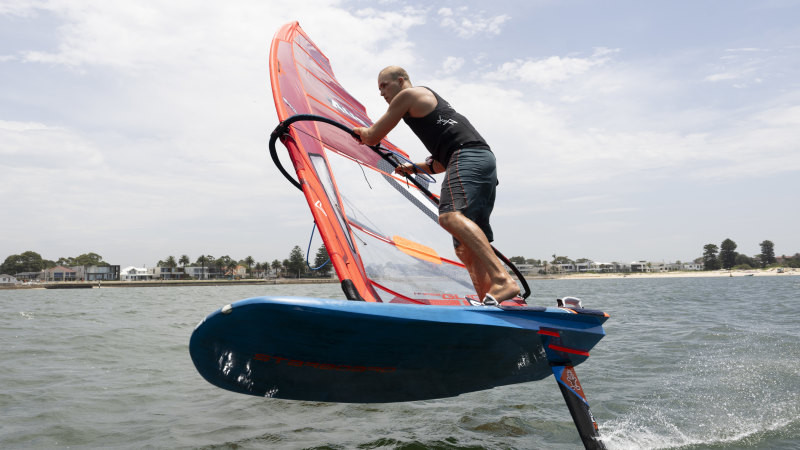Save articles for later
Add articles to your saved list and come back to them any time.
It’s the sport where athletes travel up to speeds as fast as a mako shark in complete silence.
The iQFOIL – a type of sailboard that uses a wing-like device instead of a fin to lift it out of the water – will be held at the Olympics for the first time in 2024.
Olympic prospect Grae Morris practices in Sandringham, Sydney.Credit: Janie Barrett
Come July, 24 athletes will line up along the Marseille Marina on the south coast of France to compete for a gold medal. Australian Grae Morris is hoping to be on the start line.
“Olympics is what everyone dreams about. Me, growing up, being a very sporty kid, Olympics was always on my mind,” Morris said.
Morris, a 20-year-old from Sydney’s eastern suburbs, has been windsurfing for 15 years, and made the transition to the foil six years ago.
“I thought it [the foil] was almost easier because everything felt a lot lighter and there’s less resistance,” he said. “When you’re hitting the water [on a regular windsurfer], there’s lots of resistance and power, where this [foil], if you want to do it easily, it’s really smooth. So, I found the transition quite easy and quite fun.”
Once coached by his dad Brett, a former national champion, the student has now become the master, as Grae fights to secure Australia’s only Olympic spot – a spot he qualified the country for at the Sailing World Championships earlier this year.
“Dad was always a racer, and he loved it. When I started doing that as well, it was just natural for me to be competitive,” he said. And so I started just trying to beat him, and when he realised that I could beat him, he just started helping me.”
Described by Morris as a cross-country-like event on water, where athletes race around a track at the same time, the first person to cross the finish line wins.
It’s not always smooth sailing, though. Managing a rig that includes a nine-metre square sail that can reach speeds up to 63 km/h, is a lot to control while also avoiding other competitors.
“Everything is happening so fast, and some of the time you just lose control,” Morris said.
“Whether it’s you hitting someone else, or a mark, or something breaks because there’s so much power going through it. There are a lot of crashes, and it’s just part of it. Like rugby, you get hit up.”
Morris will spend the next four months refining his skills with Fremantle-based coach Arthur Brett until the Olympic selection is made in March, starting with Sail Sydney this weekend – a competition where Olympic spots are on the line for countries yet to qualify.
The two will be on the water five days a week, on top of video review sessions, but according to Arthur, “high performance never sleeps”. And despite the relentlessness that comes with making it to the top, Morris still loves it.
“You can hear the wind, you can hear the waves, but you can’t hear yourself touching the water. It’s quite calming,” he said.
“It’s also so enjoyable that it doesn’t really feel like training at that point. When you’re enjoying it that much, it’s just another part of your day.”
Most Viewed in Sport
From our partners
Source: Read Full Article


